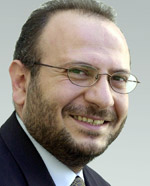Adviser to the President of Armenia, ARF member and head of the monitoring committee on anti-corruption strategies attaché to the president Bagrat Yesayan and Vice-speaker of the National Assembly and ARF member Vahan Hovhannisyan made their welcoming speeches during the international seminar entitled “GRECO experience and opportunities in the fight against corruption”.
Although ARF member and head of the constant committee on foreign relations of the National Assembly Armen Rustamyan was in Strasburg, however he had sent his message to the participants of the seminar. There were not too many participants some of the chairs were empty (including the chairs of Chief Prosecutor of Armenia Aghvan Hovsepyan, Central Bank president Tigran Sargsyan and Ombudsman Armen Harutyunyan). Apparently the latter don’t really care about the level of corruption in Armenia.
Who should fight against corruption? According to Vahan Hovhannisyan, it’s up to the people and not the legislative and executive branches of government. In his words, the ARF had proposed forming an anti-corruption committee a couple of years ago, but weren’t able to because the executive branch “didn’t want to”.
“That committee would have become corrupted on its own, so it’s better to leave the people involved in that fight against corruption on their own,” says the National Assembly vice speaker in reference to what the executive branch members had said.
V. Hovhannisyan blames the oppositionist media in the failure of the committee. According to him, oppositionist media printed pessimistic articles and “got hysterical”. In any case, Armenia has already been a member of GRECO since January 2004 and it’s time to start a dialogue.
“We mustn’t invent something new for the fight against corruption, on the contrary, we have to use the resources that we have,” says B. Yesayan, stating that our national mentality is what’s bothering us from using those “resources”. Europe doesn’t accept that mentality because it only understands homosexuals and the protection of Jehovah’s witnesses’ interests. According to Yesayan, society must control the behavior of MPs, inform the authorities in case of corruption without the fear of “turning someone in”. In his speech, B. Yesayan also said that the people wouldn’t believe in the authorities as long as there still are some “sharks on the loose”. But what’s holding the authorities (including president Robert Kocharyan, whom Yesayan gives advice to) and B. Yesayan from fighting and “catching those sharks”? The authorities can’t fight against corruption because they are among the “sharks”. It has always been like that in Armenia-after all, they’re not going to catch the authorities. So, it’s much easier to once again throw the blame on the people.
But is society really going to think about the outlooks and economic development of the country? Each member of society likes to bribe and get things done faster. A person can face so much bureaucracy when he needs to get the job done quickly that he might just go ahead and bribe. Overall, it’s no secret that workers prolong the person’s case until they don’t get what they want-money. Both individuals and businessmen give bribes and nobody can blame them in developing corruption. They are not obligated to think about the consequences that will have on the economy. But how can society stand in the way of rectors with millions of dollars getting elected, or having dumb students enter universities? What can the society do when the sons of some officials drive the fanciest cars and violate traffic laws, run over people and continue to live freely. All in all, it’s not right to throw everything on the people.
P.S. Director of the administrative and budget issues department of GRECO Carlo Kiaromonte also made a speech during the seminar. He presented “Armenia’s report” prepared by GRECO (which “168 Hours” had touched upon in the previous editions). What’s interesting though is what will happen if the Armenian authorities don’t fulfill the demands set by GRECO until September 30, 2007? From what we understood from Kiaromonte’s reply was that there will simply be nothing.

